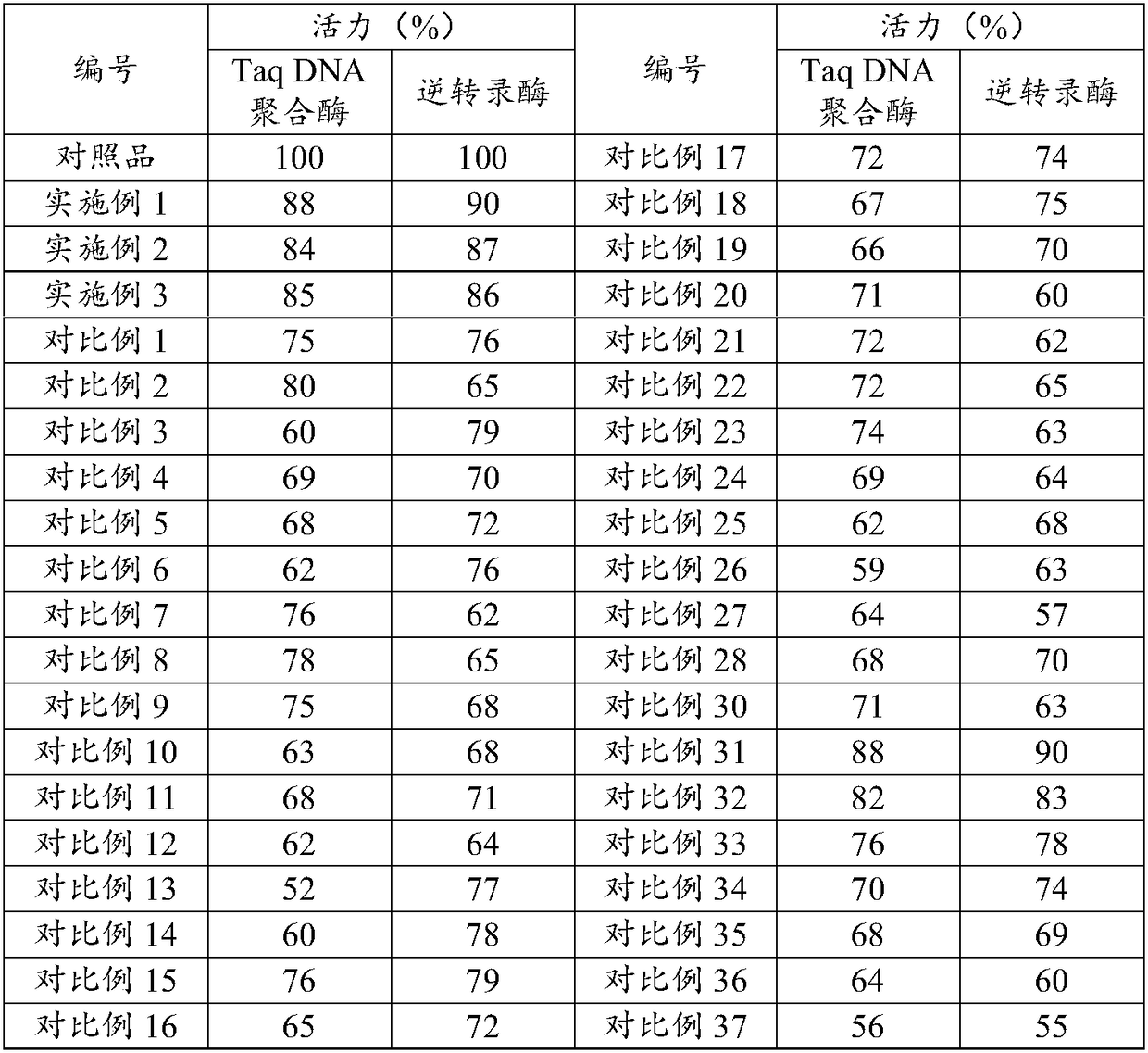Co-immobilization method for DNA polymerase and reverse transcriptase, and application of co-immobilized DNA polymerase and reverse transcriptase
A technology of reverse transcriptase and polymerase, applied in the field of enzyme engineering, can solve the problem of no co-immobilization method of DNA polymerase and reverse transcriptase, and achieve the effects of improving catalytic efficiency, high enzyme activity and stability.
- Summary
- Abstract
- Description
- Claims
- Application Information
AI Technical Summary
Problems solved by technology
Method used
Image
Examples
Embodiment 1
[0050] The method for co-immobilization of Taq DNA polymerase and MMLV reverse transcriptase in this embodiment includes the following steps:
[0051] (1) Add 0.25g of sodium alginate to 5mL of phosphate buffer containing 0.2mol / L sodium chloride, the pH of the reaction is 6.5, then add 0.0020g of Taq DNA polymerase, mix at 30℃ and fix for 2 hours , Vacuum dry, get immobilized Taq DNA polymerase;
[0052] (2) Add 5mL of Tris-HCl buffer containing 0.2mol / L sodium chloride to the immobilized Taq DNA polymerase, the pH of the reaction is 9.0, then add 0.0030g of reverse transcriptase, and mix at 30℃ Fix for 3 hours, vacuum dry, and then wash with the Tris-HCl buffer containing 0.2mol / L sodium chloride until free DNA polymerase and reverse transcriptase can not be detected in the washing solution;
[0053] (3) Freeze-drying at a temperature of -20°C and a pressure of 40 Pa to obtain co-immobilized Taq DNA polymerase and reverse transcriptase.
Embodiment 2
[0055] The method for co-immobilization of Taq DNA polymerase and MMLV reverse transcriptase in this embodiment includes the following steps:
[0056] (1) Add 0.20g of sodium alginate to 6mL of phosphate buffer containing 0.1mol / L sodium chloride at a reaction temperature of 7.0, and then add 0.0016g of Taq DNA polymerase and mix at 33°C After fixation for 1.5h, vacuum dry to obtain immobilized Taq DNA polymerase;
[0057] (2) Add 6 mL of Tris-HCl buffer containing 0.1 mol / L sodium chloride and 0.0036 g of reverse transcriptase to the immobilized Taq DNA polymerase, the pH of the reaction is 8.5, and fix for 2.5 hours after mixing at 33°C , Vacuum dry, and then wash with Tris-HCl buffer containing 0.3mol / L sodium chloride until free DNA polymerase and reverse transcriptase can not be detected in the washing solution;
[0058] (3) Freeze drying at a temperature of -15°C and a pressure of 50 Pa to obtain co-immobilized Taq DNA polymerase and reverse transcriptase.
Embodiment 3
[0060] The method for co-immobilization of Taq DNA polymerase and MMLV reverse transcriptase in this embodiment includes the following steps:
[0061] (1) Add 0.30g of sodium alginate to 4mL of phosphate buffer containing 0.3mol / L sodium chloride at a reaction temperature of 6.0, and then add 0.0024g of Taq DNA polymerase and mix at 27°C After fixation for 2.5 hours, vacuum dry to obtain immobilized Taq DNA polymerase;
[0062] (2) Add 4 mL of Tris-HCl buffer containing 0.3 mol / L sodium chloride and 0.0024 g of reverse transcriptase to the immobilized Taq DNA polymerase, the pH of the reaction is 9.5, and fix for 3.5 hours after mixing at 27°C , Vacuum dry, and then wash with Tris-HCl buffer containing 0.1 mol / L sodium chloride until free DNA polymerase and reverse transcriptase can not be detected in the washing solution;
[0063] (3) Freeze drying at a temperature of -25°C and a pressure of 30 Pa to obtain co-immobilized Taq DNA polymerase and reverse transcriptase.
PUM
 Login to View More
Login to View More Abstract
Description
Claims
Application Information
 Login to View More
Login to View More - R&D
- Intellectual Property
- Life Sciences
- Materials
- Tech Scout
- Unparalleled Data Quality
- Higher Quality Content
- 60% Fewer Hallucinations
Browse by: Latest US Patents, China's latest patents, Technical Efficacy Thesaurus, Application Domain, Technology Topic, Popular Technical Reports.
© 2025 PatSnap. All rights reserved.Legal|Privacy policy|Modern Slavery Act Transparency Statement|Sitemap|About US| Contact US: help@patsnap.com



